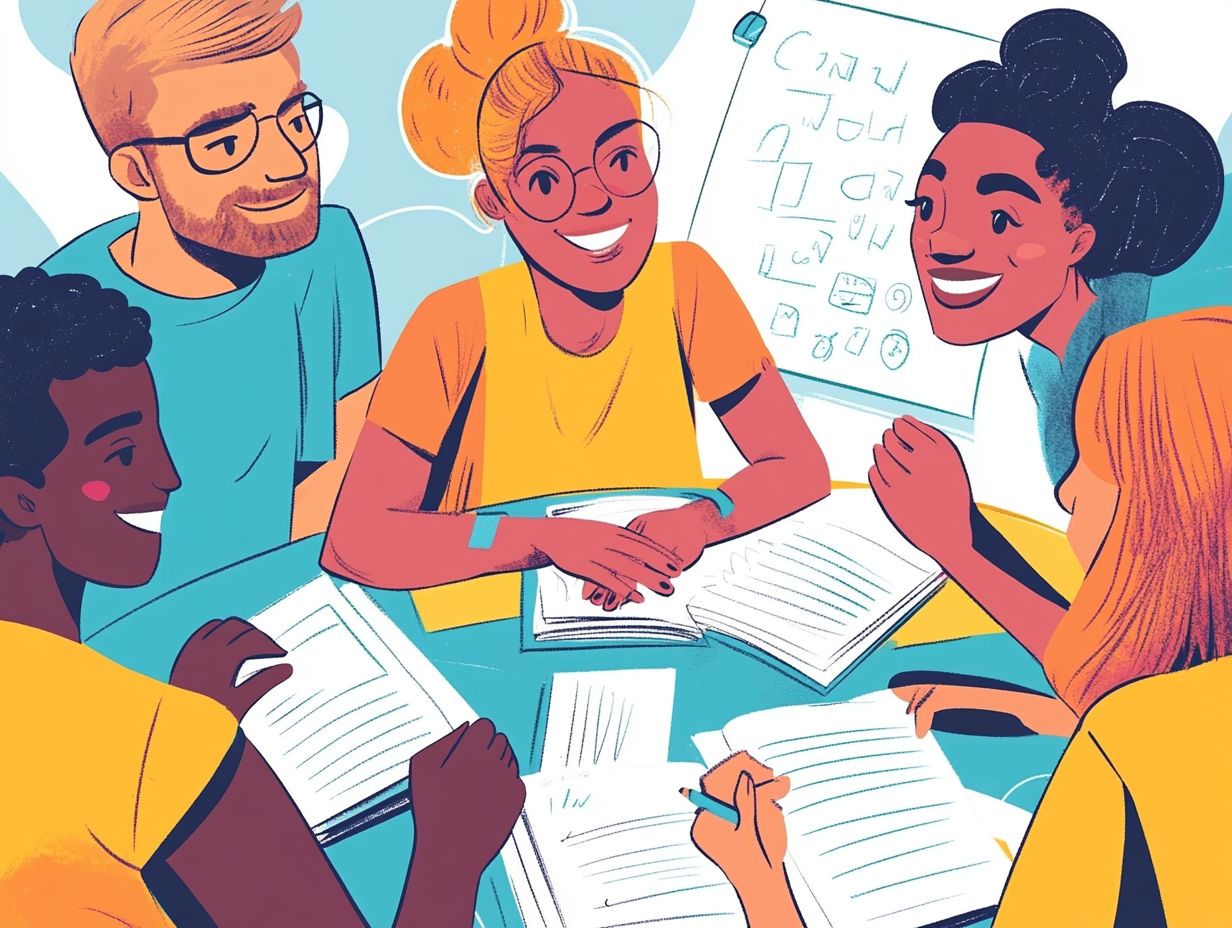the benefits of setting language learning challenges
Language learning presents a rewarding yet formidable journey, often riddled with hurdles that can dishearten even the most passionate learners.
By embracing the challenges of language learning, you can transform your experience, reaping benefits like improved retention, increased motivation, and enhanced problem-solving skills.
This article delves into the challenges you can set for yourself or tackle alongside others. It provides practical tips to help you achieve your language goals.
Explore how embracing these challenges can elevate your language skills and make your learning journey not just productive but genuinely engaging!
Contents
- Key Takeaways:
- The Benefits of Setting Language Learning Challenges
- Types of Language Learning Challenges
- Group Challenges
- Tips for Setting and Completing Language Learning Challenges
- Frequently Asked Questions
- What are the benefits of setting language learning challenges?
- How can setting language learning challenges improve language skills?
- Why does setting language learning challenges increase motivation?
- How do language learning challenges enhance memory and cognitive abilities?
- What role does setting language learning challenges play in building confidence?
- Can setting language learning challenges provide a sense of accomplishment?
Key Takeaways:

Setting challenges boosts your language skills by giving you regular practice. They also keep you motivated and focused, making you feel accomplished as you meet each goal. For insights on how to tackle these difficulties, check out the top language learning challenges and solutions. Overcoming language challenges enhances your problem-solving skills and your ability to adapt to new situations.
What are Language Learning Challenges?
Language learning challenges are the hurdles you encounter while diving into a new language, whether it s English, Spanish, or Mandarin. These obstacles can stem from various sources, including complex grammar, irregular vocabulary, and cultural nuances, often leading to frustration.
Communication challenges may hinder effective interaction, making it difficult for you to practice and hone your language skills. Recognizing these challenges is essential, as they can significantly impact your language proficiency and acquisition.
This journey can get tricky due to difficulty remembering, which might affect your ability to retain new information. Additionally, diverse educational needs whether arising from learning disabilities or different backgrounds can present barriers to mastering a new language.
These obstacles not only restrict your linguistic capabilities but also limit your ability to engage fully with different cultures. This, in turn, slows down building mutual understanding across various communities.
As you navigate these complexities, you may miss out on opportunities for meaningful dialogue and cultural exchange.
The Benefits of Setting Language Learning Challenges
Setting language learning challenges for yourself can elevate your learning experience, and understanding the top language learning challenges for motivation can unlock a range of benefits of speaking two languages and cognitive advantages vital for personal growth.
Engaging in structured challenges enhances your memory retention and boosts your creativity both essential to the learning journey.
Taking on these challenges sharpens your fluency skills and enriches your cultural understanding, ultimately supporting your lifelong learning and cognitive development.
Improved Language Retention
Improved language retention is vital when you set language learning challenges. It enables you to solidify your skills and elevate your overall communication abilities.
Consistently immersing yourself in diverse language experiences enhances your memory and cognitive functions. This boosts your self-esteem as you gain proficiency in your chosen language.
Incorporating techniques like language immersion, which means surrounding yourself with the language in everyday situations, and dynamic teaching strategies can significantly elevate this process.
Engaging with native speakers solidifies your vocabulary and helps you overcome language barriers, making your practice feel more authentic and meaningful.
Joining language communities whether online or in person opens doors to regular conversations, enriching your learning experience even further.
Utilizing multimedia resources, such as podcasts and films, deepens your understanding and makes language acquisition enjoyable. These innovative approaches cultivate an environment where you feel comfortable making mistakes, ultimately bolstering both your confidence and retention.
Start setting your language learning challenges today and watch your skills soar!
Increased Motivation and Focus

Increased motivation and focus are among the key benefits that arise when you dive into language learning challenges. As you set achievable yet stimulating goals, you ll likely experience a surge in motivation that propels you through the intricacies of language studies.
This enhanced focus not only helps you tackle difficulties but also sharpens your multitasking abilities, making you more adept at using the language.
Joining community language groups boosts your motivation even further. Engaging with peers in real-world applications think conversation clubs or cultural exchanges offers authentic language practice, transforming your learning experience into something both enjoyable and socially enriching.
Recognizing the significance of how our brains age in relation to language acquisition can inspire you to see challenges as opportunities. By staying mentally active through language learning, you can enhance your cognitive functions and potentially slow down the effects of aging. It’s a win-win that keeps your brain sharp and fully engaged.
Enhanced Problem-Solving Skills
Enhanced problem-solving skills are one of the remarkable advantages you can gain from participating in language learning challenges. As you work through different language tasks and communication hurdles, you exercise your cognitive functions, leading to improved task-switching abilities and greater adaptability in real-world contexts.
These experiences encourage critical thinking, as you must assess and interpret information in multiple languages, fostering deeper comprehension and honing your analytical abilities.
Personalized language programs meet different learning needs, allowing for tailored strategies that support your individual growth. Language educators play a vital role in this process, designing engaging curricula that spark your curiosity and creativity.
They don t just teach technical skills; they also nurture your resilience, preparing you to tackle unfamiliar situations with confidence. By cultivating an environment where mistakes are seen as a valuable part of the learning journey, language programs enable you to become a more adaptable communicator.
Types of Language Learning Challenges
Language learning challenges can be divided into two distinct categories: self-imposed challenges and group challenges. Each of these offers unique benefits and enriching experiences for you as a learner.
Self-imposed challenges, like setting personal goals for language proficiency, inspire independent exploration and cultivate lifelong learning habits.
On the other hand, group challenges found in structured language programs foster collaboration and cultural exchange, creating a supportive environment that enhances your communication skills and cognitive functions through meaningful peer interactions.
Self-Imposed Challenges
Self-imposed challenges in language learning are personalized strategies you can implement to push your limits and elevate your language skills.
You could challenge yourself to practice daily, set specific fluency targets, or engage in creative language use enabling you to take charge of your personal development while boosting your self-esteem.
For instance, consider dedicating a portion of each day to converse with native speakers. This real-world engagement not only enhances your language abilities but also enriches your cultural understanding.
Another popular approach is maintaining a language journal. Here, you can document your thoughts, reflections, or even craft creative narratives. This practice reinforces your vocabulary and grammar structures in a meaningful way.
By embracing these methods, you ll likely notice a significant sharpening of your communication skills, resulting in increased confidence in both social and professional settings.
The effectiveness of these self-imposed challenges highlights not only enhanced language retention but also cognitive benefits, as you navigate complex language systems and adapt to various communicative scenarios.
Join a language challenge today and transform your learning experience!
Group Challenges

Group challenges serve as dynamic collaborative activities that immerse you in language studies, offering rich opportunities for cultural exchange and community engagement.
By participating in these challenges, you can practice your language skills while building effective support systems that boost your motivation and focus.
These collaborative experiences encourage open communication, enhancing your ability to articulate thoughts and ideas in a new language.
As you navigate tasks with others, you ll engage in dialogues that require negotiation, clarification, and teamwork key elements of effective communication.
Immersing yourself in diverse perspectives fosters deeper cultural understanding, allowing you to appreciate the nuances of various traditions and viewpoints.
This cultural immersion enriches your language learning journey and equips you with invaluable interpersonal skills essential in today’s interconnected world.
Tips for Setting and Completing Language Learning Challenges
Setting and completing language learning challenges requires careful planning and strategies tailored to your educational needs.
By establishing clear, realistic goals and holding yourself accountable, you can navigate the intricacies of language acquisition while making substantial strides in your fluency skills.
Setting Realistic Goals
Setting realistic goals is crucial for your language learning journey. It helps you maintain focus and motivation while navigating the complexities of acquiring a second language.
By tailoring your objectives to align with your current proficiency and personal development aspirations, you create a more structured and fulfilling learning experience.
Support from mentors or language exchange partners can elevate your journey. Using SMART criteria Specific, Measurable, Achievable, Relevant, and Time-bound enables you to outline challenging yet attainable goals.
For example, you might aim to:
- Hold a 10-minute conversation in your target language within three months.
- Read one book each month to enrich your vocabulary.
Integrating periodic reviews and feedback ensures your learning stays in sync with your growth, highlighting the importance of lifelong learning habits that adapt as your proficiency evolves.
Staying Accountable and Motivated
Staying motivated is key to your success in language learning challenges. This commitment encourages you to overcome obstacles that may arise.
By establishing support networks within language communities, you enhance your motivation. These networks provide not just encouragement but also valuable feedback and shared experiences that make the journey more enjoyable.
Practical techniques like tracking your progress serve as powerful tools for self-assessment and reflection. Regularly noting your advancements helps you recognize how far you’ve come and pinpoint areas for improvement.
Celebrating milestones, regardless of size, creates joyful moments that foster a positive attitude toward learning.
Engaging with peers through group discussions or study sessions enhances your experience. Sharing challenges and achievements ignites creativity and revives your enthusiasm. This interaction reinforces your commitment and cultivates a sense of belonging, transforming the often solitary endeavor of language acquisition into a rewarding collaborative journey.
Frequently Asked Questions

What are the benefits of setting language learning challenges?
Setting language learning challenges helps improve language skills, increase motivation, enhance memory and cognitive abilities, build confidence, and provide a sense of accomplishment.
How can setting language learning challenges improve language skills?
By setting specific goals and challenges, learners can focus their efforts and make measurable progress in their language learning. This leads to improved vocabulary, grammar, speaking, listening, reading, and writing abilities.
Start your language challenge today and experience the joy of learning!
Why does setting language learning challenges increase motivation?
Setting challenges gives learners purpose. When they pursue goals, they stay motivated and engaged.
How do language learning challenges enhance memory and cognitive abilities?
Learning a new language challenges the brain. This boosts memory, critical thinking, and problem-solving skills.
What role does setting language learning challenges play in building confidence?
Challenges help learners face their fears about language skills. Completing these tasks boosts their confidence.
Can setting language learning challenges provide a sense of accomplishment?
Yes! Completing challenges gives learners a sense of pride. This motivates them to keep learning and set new challenges.






